On December 9, 2022, the 3rd International AI Cooperation and Governance Forum kicked off at Tsinghua University. Themed “AI Governance and International Cooperation for a Resilient Future,” the forum was hosted by Tsinghua University and organized by the Institute for AI International Governance (I-AIIG) of Tsinghua University. Wang Xiqin, President of Tsinghua University, delivered welcome remarks at the opening ceremony. Opening speeches were then delivered by invited guest speakers including Li Meng, Vice Minister of the Ministry of Science and Technology of China; Xu Xiaolan, Vice Minister of the Ministry of Industry and Information Technology of China; Ma Shengkun, Deputy Director-General of the Department of Arms Control at the Ministry of Foreign Affairs of China; Siddharth Chatterjee, UN resident coordinator in China; Beate Trankmann, UNDP resident representative in China; and Shahbaz Khan, director of the UNESCO Cluster Office in Beijing. The opening ceremony was moderated by Jiang Peixue, Vice President of Tsinghua University.
Wang Xiqin began his remarks with a warm welcome on behalf of Tsinghua University to all the participants of the forum. He noted that the new round of technological and industrial revolution is making dramatic advances in our world today, and emerging technologies—AI in particular—are progressing rapidly, pushing humankind into an era of intelligent interconnection of everything with the triadic integration of “human, machine and things.” AI is reshaping the way of knowledge acquisition and dissemination, restructuring technological innovation and industrial patterns, and profoundly affecting the international political and economic landscapes as well as the way we live and work. From a relational perspective, AI is restructuring the human society; from a value perspective, it has become a “double-edged sword” in shaping our value systems; from an institutional perspective, it has posed new requirements and challenges to government and enterprise management as well as public governance; from an organizational perspective, AI has changed the organization of society; and from an operational perspective, it has reshaped the way our society functions.
Wang Xiqin then pointed out that Tsinghua University has always attached great importance to scientific research, technological innovation, ethics education and technological governance in the field of AI: the University has created a research matrix for AI R&D, industry and governance, and facilitated high-level platforms such as the International AI Cooperation and Governance Forum, as an effort to promote the establishment of a secure, fair and just international AI governance system and rules. Tsinghua is ready to work together with global partners in promoting innovation and using technology for good, in being enablers of intelligent innovation, guardians of technology ethics and pioneers of intelligent governance, and in fostering global innovation cooperation, so as to make new and greater contributions to building a community with a shared future for mankind and a world of lasting peace, security for all, common prosperity, openness, inclusiveness and better livability, Wang stressed.
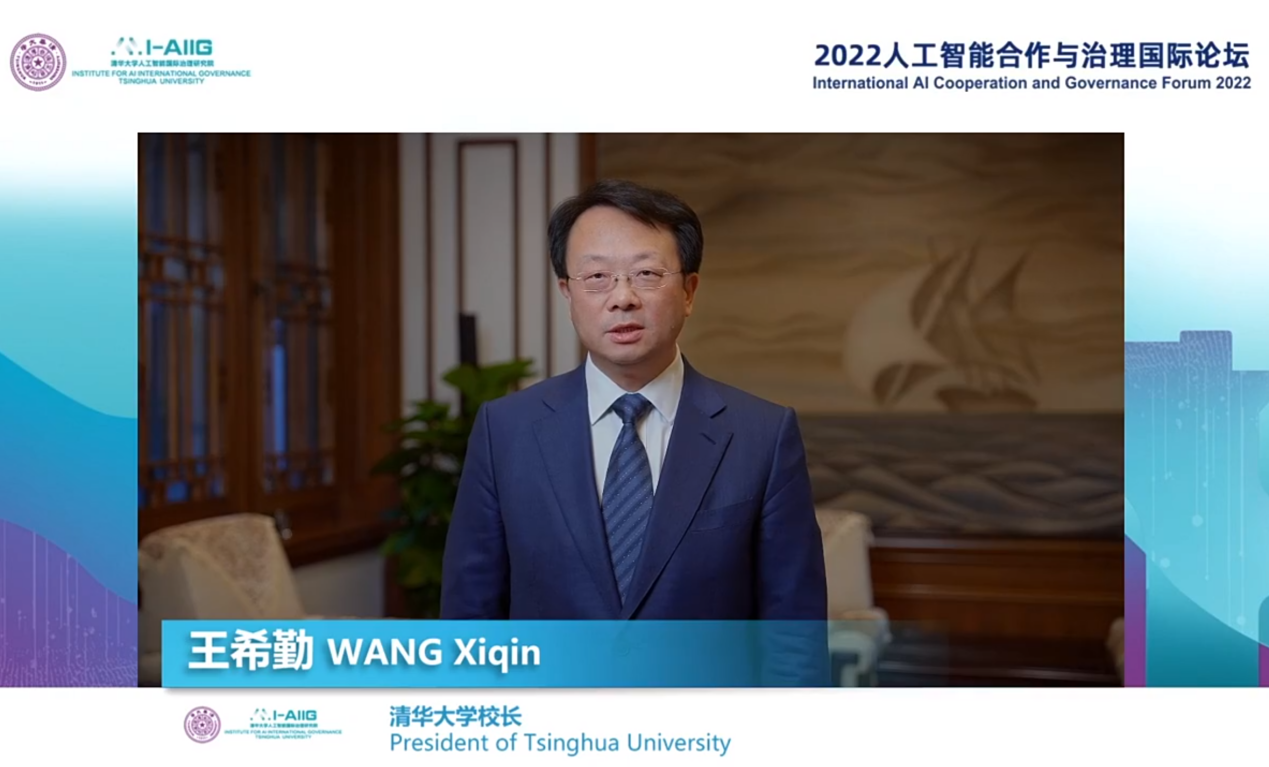
Welcome remarks by Wang Xiqin
Li Meng, Vice Minister of the Ministry of Science and Technology of China, said in his speech that China has made rapid headway in AI over recent years and built a development pattern of basic research, technology application, scenario-driven planning and ethical governance. AI governance is a high priority for China, which has been deeply expanded at the practical level, forming a synergistic and complementary relationship with the application of AI technologies. China has been actively participated in international AI cooperation and governance, deeply engaged in AI governance under multilateral mechanisms in order to find the broadest common ground among countries. Li suggested that the realization of intelligence for good requires concerted action at all levels in all countries: first, it requires a roadmap that ensures parallel advances in technological development and security governance; second, it requires agile governance with enhanced capacity to respond to worst-case scenarios and risks; third, it required efforts to ensure multistakeholder participation and shared responsibility; and fourth, it requires an open and inclusive cooperative governance system that seeks common ground while putting aside differences. The unstoppable wave of intelligentification is a call on us to embrace the great opportunities it brings, speed up the development and breakthroughs of AI theories and technologies, promote policy innovation and manage ethical risks, strengthen cooperation and exchange, seek new perspectives and solutions for AI governance, so as to facilitate the steady and sustainable development of AI.
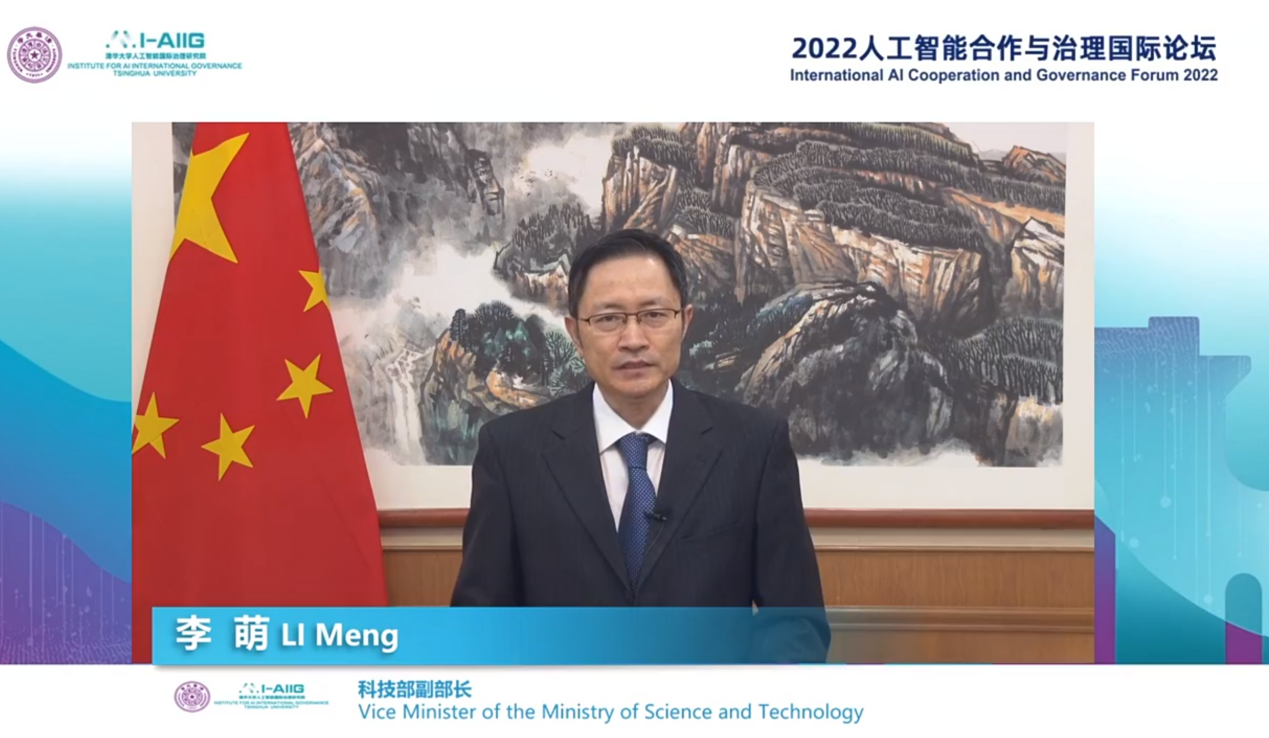
Opening speech by Li Meng
Xu Xiaolan, Vice Minister of the Ministry of Industry and Information Technology of China, said in her address that as the Chinese government attaches great importance to the development of AI industry and governance system, MIIT has made practical efforts to implement the important decisions and plans of the CPC Central Committee and the State Council, including strengthening collaboration and promoting the deep integration of AI and the real economy, which has led to rapid growth in industrial innovation capacity and scale as well as to the emergence of new models and business formats in AI-empowered sectors. As a result, the AI industry in China has become increasingly high-end, intelligent and green. Strengthening the resilience of AI governance and promoting the development of future technologies is in the common interest of all countries. Xu called for domestic and international cooperation in advancing AI governance and laying a scientific foundation for the digital society: first, by consolidating the leading role of technology, which will ensure a secure and reliable foundation for AI development; second, by accelerating industrial practice and improving the level of application innovation and effective governance; and third, by jointly facilitating the steady and sustainable development of AI through opening up and cooperation. She called on all stakeholders to deepen their communication and share experience with each other, so as to promote AI development and offer Chinese wisdom to the establishment of a global AI governance system.
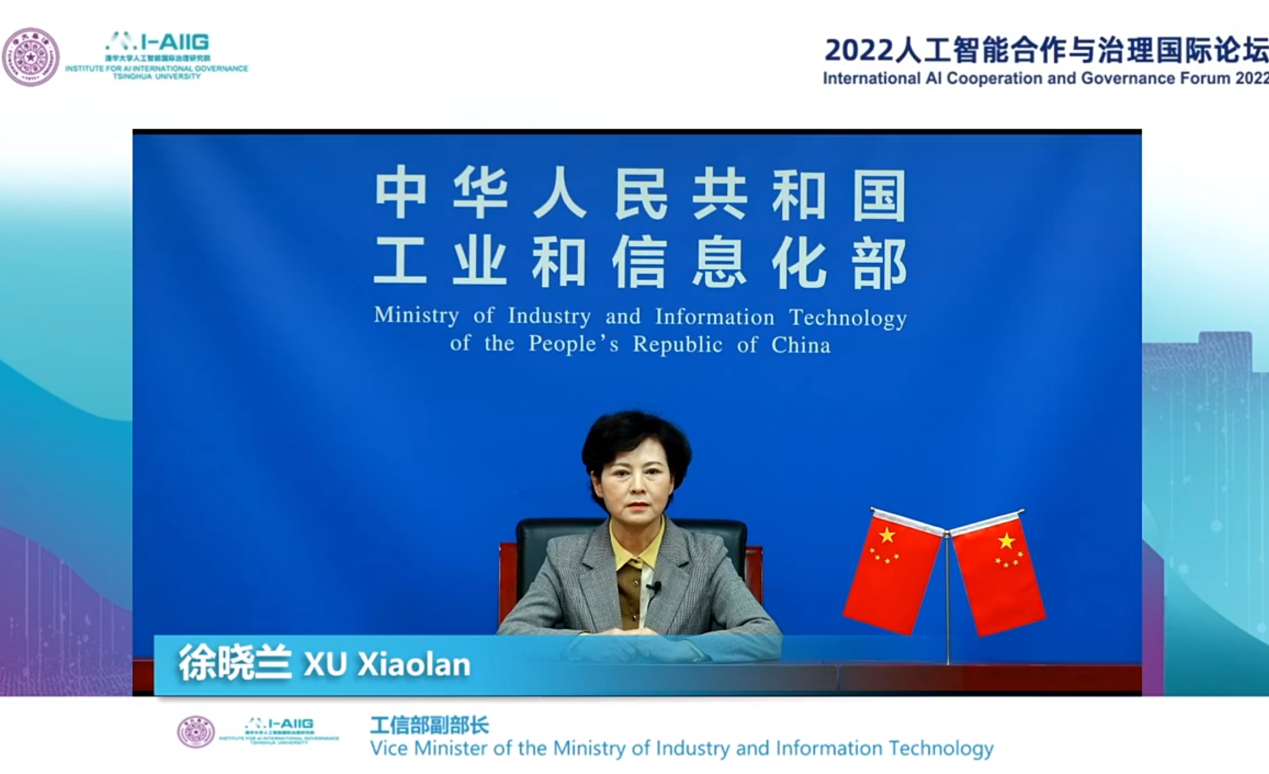
Opening speech by Xu Xiaolan
Ma Shengkun, Deputy Director-General of the Department of Arms Control at the Ministry of Foreign Affairs of China, said in his remarks that the fast-evolving AI technology and overwhelming wave of metaverse have sparked the aspirations of people of all countries to explore the charms of a smart life in the future. At the same time, the international community is increasingly concerned about the emerging security, legal, ethical and social risks associated with AI. It has become a common challenge for all countries to coordinate security and development and to use AI to empower sustainable global development and serve the wellbeing of all. The Chinese government attaches great importance to AI-related risks, and the global governance of AI should follow three basic concepts: first, it should always serve the vision of a community with a shared future for mankind; second, it should practice true multilateralism; and third, it should advocate the “priority of ethics.” In response to the universal and revolutionary impact of AI, China should always take an active part in the creation and reform of a global AI governance system in a highly responsible manner, said Ma. China believes in promoting global governance of AI in four aspects: improving the policy governance system, strengthening technical risk control, promoting responsible innovation and application, and encouraging collaborative multistakeholder governance.
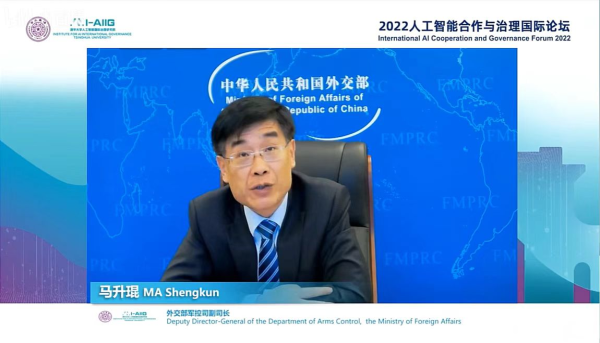
Opening speech by Ma Shengkun
Siddharth Chatterjee, UN resident coordinator in China, noted that AI has allowed us to be much more effective in addressing the problems our world faces, but it can also pose risks. AI governance is especially important given that AI is a technology that transcends national borders and is being applied in diverse contexts. Global cooperation and consensus on the standardization of AI ethics and regulations is critical to ensure a secure and stable global landscape. To this end, AI regulation is also involved in the Global Digital Compact to be agreed on by governments at the UN Summit of the Future in 2024 to enable the international community to come together to build a digital future. In this process, AI governance should be multilateral, and it will be critical for the voices of developing countries to be amplified in global discussions. In addition, the Global Digital Compact is also a multistakeholder and multidisciplinary effort given the diversity of AI application scenarios and the possible risk of fragmented and conflicting governance solutions. The UN will continue to play a convening role in fostering dialogue on normative and cooperation frameworks to ensure that AI systems are ethical and fair, and urge all key stakeholders to join in pushing forward concrete action to realize a resilient and human-centered future.
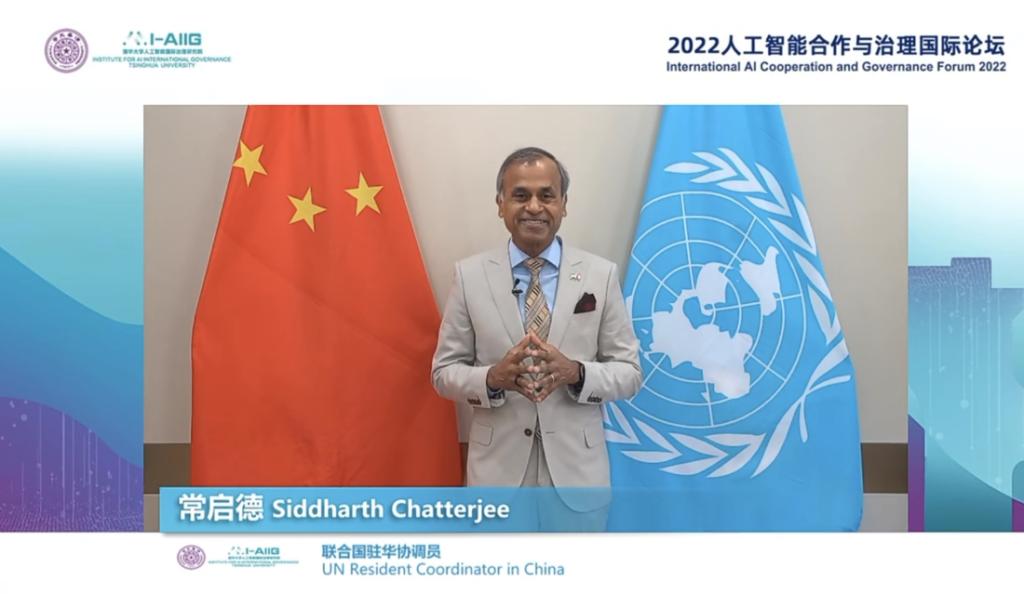
Opening speech by Siddharth Chatterjee
Beate Trankmann, UNDP resident representative in China, pointed out that while AI should not be over-regulated, or innovation will be stifled, it must be better regulated to protect the society. Establishing a sound AI governance framework with oversight and ethical guidance is key not only in privacy protection during data collection, but also in ensuring AI does not deepen societal divides and discrimination, as the algorithms behind it risk carrying the same biases as the people programming them.
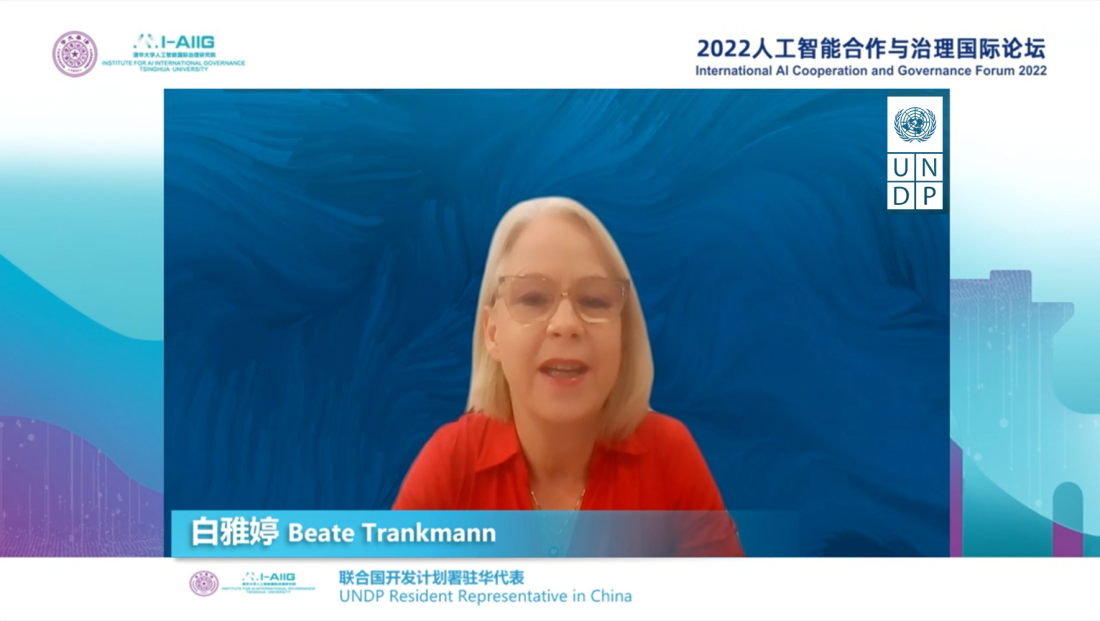
Opening speech by Beate Trankmann
Shahbaz Khan, director of the UNESCO Cluster Office in Beijing, stressed that along with multiple advantages, AI technologies also generate downside risks and challenges. First, AI-driven growth is likely to be highly unequal. AI has a “winner takes all” dynamic: concentration of AI in the hands of few high-income countries will likely leave developing countries far behind. Second, AI contributes to widening existing gender gaps. Because women are underrepresented in the industry, gender biases and stereotyping are being reproduced in AI technologies. Khan believes that multilateralism has a fundamental role to play in establishing clear international standards, and that this forum is well aligned with UNESCO’s work in China and globally. The Recommendation on the Ethics of Artificial Intelligence adopted in 2021, the very first global standard-setting instrument on the subject, will not only protect but promote human rights and human dignity, and will be an ethical guiding compass and a global normative bedrock which is allowing to build strong respect for the rule of law in the digital world.
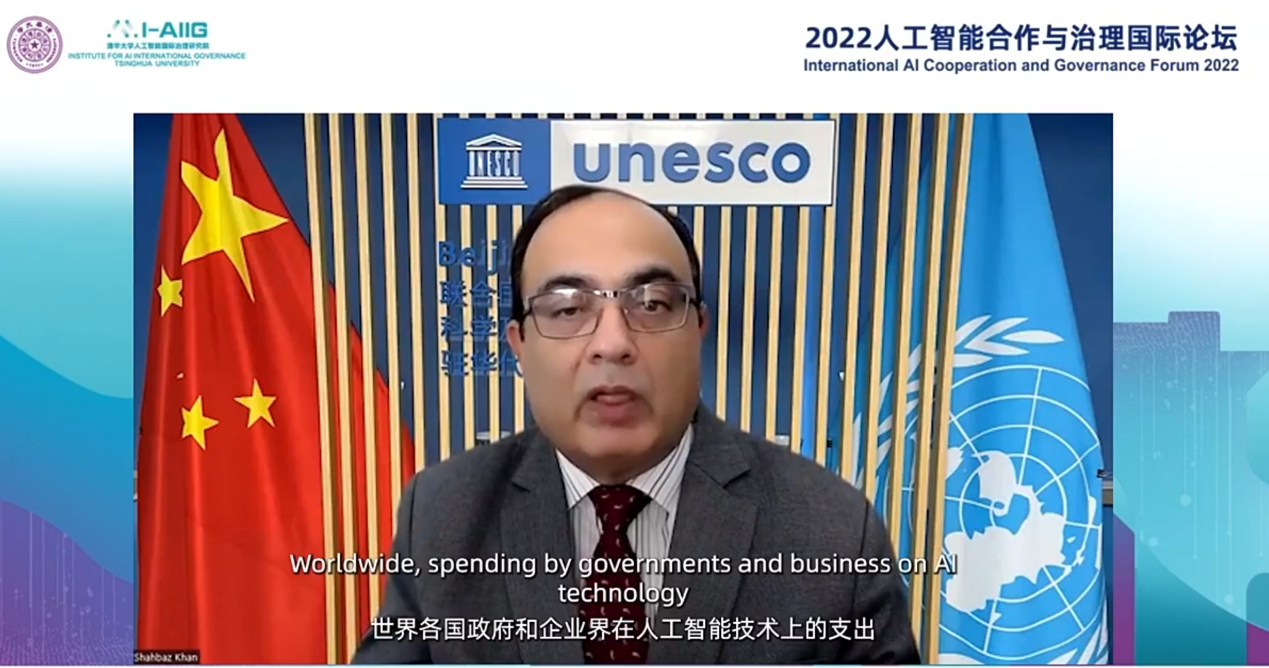
Opening speech by Shahbaz Khan
After the opening ceremony, a main plenary themed “AI Governance and International Cooperation for a Resilient Future” was held. Among the keynote speakers were Xu Haoliang, UN Assistant Secretary-General and Director of the Bureau for Policy and Programme Support at UNDP; Gong Ke, Past President of the World Federation of Engineering Organizations and executive director of the China Institute of New Generation Artificial Intelligence Development Strategies; Zhang Hongjiang, Foreign Academician of the National Academy of Engineering and chairman of the Beijing Academy of Artificial Intelligence; and Yolanda Gill, Past President of the Association for the Advancement of Artificial Intelligence. The plenary was moderated by Xue Lan, Dean of I-AIIG.
The two-day forum had three main plenaries, eight sub-forums and the U&AI Bootcamp special event. More than 100 experts from over 20 countries attended. The live broadcast of the forum reached 7 million views.